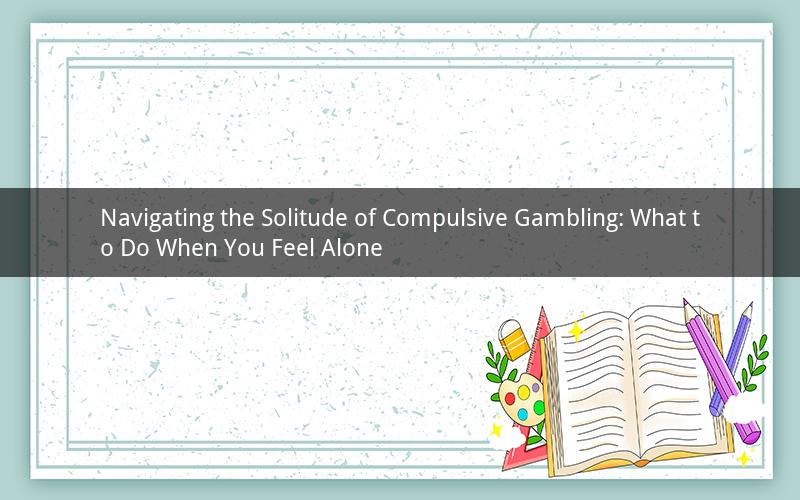
Compulsive gambling, often referred to as problem gambling, can be a devastating addiction that affects individuals from all walks of life. When faced with the dilemma of an uncontrollable urge to gamble, coupled with the isolation that comes with it, the path forward can seem daunting. This article delves into what to do if you can't stop gambling and are feeling alone.
1. Acknowledge the Problem
The first step in dealing with any addiction, including gambling, is to acknowledge that you have a problem. Admitting that you are struggling with gambling is a significant moment and can be liberating. It opens the door to seeking help and support.
2. Reach Out to Trusted Individuals
When you're feeling alone, it's crucial to reach out to someone you trust. This could be a close friend, family member, or colleague. Sharing your struggles with someone you care about can provide emotional support and a sense of relief. Remember, you're not alone in this journey.
3. Find a Support Group
Support groups can be an invaluable resource for individuals struggling with compulsive gambling. These groups offer a safe space to share experiences, learn from others, and gain insights into the addiction. Look for a support group that fits your needs and preferences.
4. Seek Professional Help
If you're unable to control your gambling habits on your own, seeking professional help is essential. A therapist or counselor specializing in addiction can provide personalized guidance and strategies to overcome your compulsive gambling. Therapy can also address any underlying issues that may be contributing to your addiction.
5. Create a Personalized Recovery Plan
Developing a personalized recovery plan is crucial in overcoming compulsive gambling. This plan should include specific goals, strategies, and resources to help you stay on track. Consider incorporating the following elements into your plan:
- Set strict limits on your gambling activities, including time and money spent.
- Avoid situations and triggers that may lead to gambling.
- Develop healthy coping mechanisms, such as exercise, hobbies, or socializing with friends and family.
- Stay connected with your support system and attend support group meetings regularly.
6. Explore Online Resources
The internet offers a wealth of resources for individuals struggling with compulsive gambling. Online support groups, counseling services, and educational materials can provide valuable information and support. Utilize these resources to enhance your recovery journey.
7. Practice Self-Compassion
Overcoming an addiction can be challenging, and it's essential to practice self-compassion throughout the process. Be kind to yourself, acknowledge your progress, and forgive yourself for setbacks. Remember that recovery is a journey, and it's okay to take one step at a time.
8. Stay Informed about Treatment Options
Research various treatment options and stay informed about the latest advancements in the field of addiction. This knowledge can empower you to make informed decisions and find the best-suited approach for your recovery.
9. Build a Supportive Network
Surround yourself with individuals who support your recovery journey. This network can include friends, family, professionals, and fellow gamblers in recovery. Building a strong support system can provide emotional support, encouragement, and accountability.
10. Stay Focused on Long-Term Recovery
Recovery from compulsive gambling is a lifelong journey. Stay focused on long-term recovery by maintaining your personalized plan, attending support group meetings, and seeking help when needed. Remember that relapse is a possibility, but it doesn't define your recovery.
Frequently Asked Questions (FAQs)
1. How can I overcome my gambling addiction when I feel alone?
Answer: Overcoming a gambling addiction when feeling alone is challenging, but it's possible. Start by acknowledging your problem, reaching out to trusted individuals, finding a support group, and seeking professional help. Surround yourself with a supportive network and focus on long-term recovery.
2. What should I do if I can't stop gambling, and I don't have anyone to talk to?
Answer: If you feel isolated and can't stop gambling, consider seeking help through online resources, such as support groups, counseling services, and educational materials. Reach out to online communities or mental health professionals who can provide guidance and support.
3. How can I rebuild trust with loved ones after a gambling addiction?
Answer: Rebuilding trust with loved ones after a gambling addiction requires time, honesty, and commitment. Be transparent about your struggles, take responsibility for your actions, and follow through on promises. Engage in activities that demonstrate your commitment to recovery, and be patient with the healing process.
4. Can I overcome a gambling addiction without professional help?
Answer: While it's possible to overcome a gambling addiction without professional help, it's often more challenging. Professional help, such as therapy or counseling, can provide personalized strategies, support, and guidance to increase your chances of successful recovery.
5. What are some common triggers for compulsive gambling?
Answer: Common triggers for compulsive gambling include stress, boredom, social events, and feelings of loneliness. Recognizing and addressing these triggers can help prevent relapse and support your recovery journey.